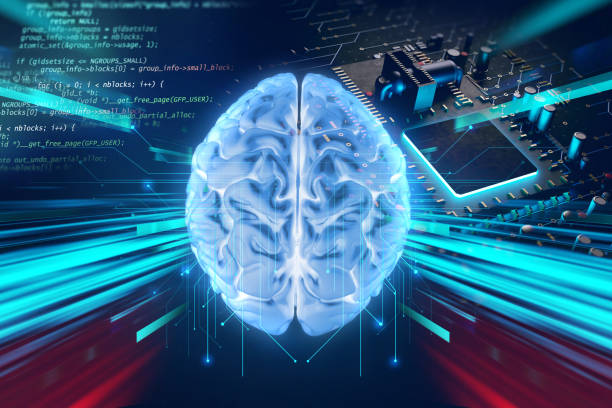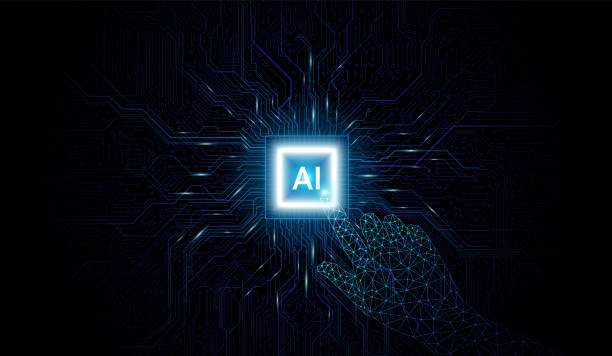What is Artificial Intelligence and how does it work?
#Artificial_Intelligence (AI) is a branch of computer science that deals with building machines capable of performing tasks that usually require human intelligence.
These tasks include learning, problem-solving, pattern recognition, reasoning, and decision-making.
Artificial intelligence tries to implement these processes in computers.
The basis of artificial intelligence is based on algorithms and mathematical models that allow machines to learn from data and identify patterns.
Machine learning, one of the important sub-branches of artificial intelligence, allows machines to learn from their experiences and improve their performance without explicit programming.
To read more about the definition of artificial intelligence, you can refer to Wikipedia.
Artificial intelligence tries to simulate human thinking processes using various methods such as neural networks, genetic algorithms, and expert systems.
Neural networks are designed inspired by the structure of the human brain and are capable of learning complex patterns from data.
Genetic algorithms, by mimicking the process of natural evolution, seek to find the best solutions for various problems.
Expert systems also help to provide advice and decision-making by collecting specialized knowledge in a specific field.
Ultimately, the main goal of artificial intelligence is to create machines that can act independently and intelligently.
Are you bothered by losing customers due to the old appearance or slow speed of your online store? The expert team of Rasaweb solves these problems by designing a professional online store!
✅ Increase customer trust and the credibility of your brand
✅ Breathtaking speed and excellent user experience
Get a free consultation with Rasaweb right now ⚡
Types of artificial intelligence and their applications
Artificial intelligence can be divided into several categories based on its capabilities and applications.
One of these classifications is the classification based on the capabilities of artificial intelligence, which includes Narrow AI, General AI, and Super AI.
Narrow AI is only capable of performing a specific task, such as facial recognition or playing chess.
General AI has the ability to do anything that a human is capable of doing.
Super AI also surpasses human intelligence and is capable of solving more complex problems than humans.
The applications of artificial intelligence are very wide and have affected almost all industries.
In medicine, artificial intelligence is used to diagnose diseases, develop drugs, and improve patient care.
In the automotive industry, artificial intelligence is used to develop self-driving cars and improve driving safety.
In the financial field, artificial intelligence is used to detect fraud, manage risk, and provide financial consulting services.
Also, in marketing, artificial intelligence is used to analyze customer data, personalize advertising, and improve customer experience.
This variety of applications shows the increasing importance of artificial intelligence in today’s world.
Machine learning and its role in the development of artificial intelligence
Machine Learning (ML) is one of the most important sub-branches of artificial intelligence that allows machines to learn from data and improve their performance without explicit programming.
In machine learning, algorithms teach machines to identify patterns and relationships in data and use these patterns for prediction or decision-making.
There are different types of machine learning algorithms, including supervised learning, unsupervised learning, and reinforcement learning.
In supervised learning, the machine learns using labeled data, while in unsupervised learning, the machine must automatically identify patterns from unlabeled data.
Reinforcement learning also allows machines to learn optimal strategies by interacting with the environment.
The role of machine learning in the development of artificial intelligence is very vital.
Many advanced applications of artificial intelligence, such as facial recognition, voice recognition, and language translation, are developed based on machine learning algorithms.
With the advancement of machine learning algorithms and the increase in the volume of available data, the possibility of developing smarter and more efficient systems has been provided.
Deep Learning, one of the advanced branches of machine learning, is capable of solving more complex problems and providing more accurate results by using deep neural networks.
In general, machine learning acts as a driving force in the development of artificial intelligence and provides the possibility of creating machines that are capable of learning, adapting, and solving various problems.
| Algorithm type | Descriptions | Applications |
|---|---|---|
| Supervised learning | Training using labeled data | Image recognition, price prediction |
| Unsupervised learning | Identifying patterns in unlabeled data | Customer clustering, dimension reduction |
| Reinforcement learning | Learning by interacting with the environment | Computer games, robotics |
Challenges and limitations of artificial intelligence
Despite the remarkable advances in the field of artificial intelligence, there are still many challenges and limitations that need to be overcome.
One of the most important challenges is the issue of #ethics in artificial intelligence.
With the development of smarter systems, questions are raised about the accountability, transparency, and impartiality of these systems.
For example, if a self-driving car causes an accident, who is responsible? How can discrimination be prevented in artificial intelligence algorithms? These questions require careful consideration and the development of appropriate laws and regulations.
Technical limitations are also among the challenges facing artificial intelligence.
Many artificial intelligence algorithms require a large amount of data and computing resources that may not be available.
Also, some complex issues, such as natural language understanding and logical reasoning, are still difficult for artificial intelligence systems.
In addition, the issue of security is also of high importance.
Artificial intelligence systems can be the target of cyber attacks and expose sensitive information to danger.
Therefore, the development of appropriate security methods to protect artificial intelligence systems is necessary.
Are you lagging behind in competition with large online stores?
Rasaweb will make your business online and increase your market share by designing a professional online store!
✅ Increase brand credibility and customer trust
✅ Easy shopping experience leads to more sales
⚡ Act now to receive free website design consultation!
The future of artificial intelligence and its impact on our lives
The future of artificial intelligence is very bright and full of potential.
With the ever-increasing advances in this field, artificial intelligence is expected to play a more important role in our lives.
In the future, artificial intelligence can help solve complex problems, improve the quality of life, and increase productivity.
For example, in the field of healthcare, artificial intelligence can help diagnose diseases faster and more accurately, develop new drugs, and provide personalized care.
In the field of education, artificial intelligence can help provide customized training, evaluate student performance, and provide appropriate feedback.
However, the development of artificial intelligence also comes with challenges that need to be addressed.
One of the most important challenges is the issue of employment.
With the automation of many tasks by artificial intelligence, some jobs may be lost.
Therefore, it is necessary for people to prepare for new jobs and learn the skills needed to work with artificial intelligence.
Also, it is necessary for governments and organizations to develop appropriate policies to support vulnerable people and create new job opportunities.
In general, the future of artificial intelligence requires cooperation and coordination between experts, policymakers, and society so that its potential can be used in the best way and its potential dangers can be avoided.
For more information about the future of artificial intelligence, you can refer to specialized articles.
Artificial intelligence in Iran: Current situation and prospects
Artificial intelligence in Iran has also been considered as an important and strategic technology.
In recent years, many efforts have been made to develop artificial intelligence in Iran, including the establishment of research centers, holding conferences and training workshops, and supporting startups active in this field.
However, there are still challenges that need to be overcome.
One of the most important challenges is the shortage of skilled and experienced manpower in the field of artificial intelligence.
It is necessary for universities and educational centers to offer suitable educational programs to train specialists in this field.
Also, it is necessary for the government and the private sector to invest more in research and development of artificial intelligence.
The outlook for artificial intelligence in Iran is bright.
Considering the existing potentials and the efforts made, artificial intelligence is expected to play an important role in the economic and social development of the country.
Currently, the applications of artificial intelligence in Iran are expanding in various fields such as agriculture, healthcare, transportation, and energy.
By developing the necessary infrastructure and training specialists, the potential of artificial intelligence can be used in the best way and become a leading country in this field.
For more information about international cooperation in the field of artificial intelligence, you can visit the website of the US Embassy.
Artificial intelligence development tools and how to work with them
To develop artificial intelligence systems, there are various tools and libraries that help programmers.
One of the most popular tools is Python.
Python is a powerful and flexible programming language that has many libraries for machine learning, natural language processing, and computer vision.
Libraries such as TensorFlow, Keras, and PyTorch are powerful tools for building and training machine learning models.
Also, libraries such as NLTK and SpaCy are available for natural language processing and OpenCV for computer vision.
The way to work with these tools is usually in such a way that the required data is first collected and prepared.
Then, a suitable machine learning model is selected and trained.
After training, the model is evaluated and, if necessary, its settings are changed.
Finally, the model is ready to be used in various programs and systems.
To get started with these tools, many educational resources are available, including online tutorials, books, and training courses.
By learning these tools, you can develop smart and efficient systems that are capable of solving various problems.
| Tool | Descriptions | Applications |
|---|---|---|
| Python | Powerful programming language | Development of machine learning models |
| TensorFlow | Machine learning library | Building and training neural networks |
| Keras | High-level API for TensorFlow | Simplifying the model development process |
| PyTorch | Machine learning library | Research and development of new models |
Ethics in Artificial Intelligence: Challenges and Solutions
As previously mentioned, ethics in artificial intelligence is one of the most important challenges facing this technology.
Artificial intelligence systems can have profound effects on the lives of individuals and society, so it is necessary that these systems are designed and used in a way that respects ethical values.
One of the most important challenges is the issue of #discrimination in artificial intelligence algorithms.
If the training data used to train artificial intelligence models are biased, the models may also learn this bias and apply it in their decisions.
To deal with this challenge, it is necessary for the training data to be carefully examined and the biases in them to be removed.
Also, it is necessary for artificial intelligence algorithms to be designed in a way that they act more fairly and impartially.
In addition, the issue of accountability is also of high importance.
If an artificial intelligence system causes damage, who is responsible? How can the damage be compensated? To answer these questions, it is necessary for appropriate laws and regulations to be developed that determine the accountability of artificial intelligence systems.
In general, ethics in artificial intelligence requires attention and cooperation between experts, policymakers, and society so that the potential of this technology can be used in the best way and its potential dangers can be avoided.
Are you losing potential customers due to a non-professional website? Rasaweb is your answer! With our specialized corporate website design services:
✅ Enhance the credibility and position of your business
✅ Experience attracting more targeted customers
⚡ Act now to receive a free consultation!
The Impact of Artificial Intelligence on Various Industries
Artificial intelligence has widespread effects on various industries and changes the way they operate.
In the #healthcare industry, artificial intelligence helps to diagnose diseases faster and more accurately, develop new drugs, and provide personalized care.
Artificial intelligence systems can analyze medical images and identify abnormalities, review patient data and identify disease patterns, and assist physicians in clinical decision-making.
Also, artificial intelligence can help develop new drugs by simulating the effects of drugs on the body and identifying new molecules with therapeutic potential.
In the manufacturing industry, artificial intelligence helps to improve productivity, reduce costs, and increase quality.
Artificial intelligence systems can optimize production processes, identify defects and prevent the production of defective products, and help with predictive maintenance of equipment.
Also, artificial intelligence can help develop new products by analyzing customer data and identifying their needs.
In the financial industry, artificial intelligence helps to detect fraud, manage risk, and provide financial consulting services.
Artificial intelligence systems can identify suspicious patterns and prevent illegal activities, assess financial risks and recommend appropriate strategies, and help customers manage their investments.
These are just a few examples of the effects of artificial intelligence on various industries.
With the ever-increasing advances in this field, artificial intelligence is expected to play a more important role in the global economy.
How to Learn Artificial Intelligence?
Learning artificial intelligence requires effort and perseverance, but by using the right resources and effective learning methods, you can progress in this field.
One of the best ways is to start with basic concepts.
First, you should become familiar with basic concepts such as machine learning, neural networks, and optimization algorithms.
Many resources are available for learning these concepts, including online tutorials, books, and training courses.
After learning the basic concepts, you can move on to learning the necessary tools and libraries.
As previously mentioned, Python is a popular programming language for developing artificial intelligence systems, so learning Python is an important step in learning artificial intelligence.
After learning Python, you can move on to learning libraries such as TensorFlow, Keras, and PyTorch.
To learn these tools, you can use online tutorials, books, and training courses.
In addition, participating in practical projects can also help you in learning artificial intelligence.
By participating in practical projects, you can apply the concepts and tools you have learned in practice and gain valuable experiences.
In general, learning artificial intelligence requires a combination of theoretical and practical learning.
By using the right resources and effort and perseverance, you can achieve success in this field.
To start learning, you can use Coursera training courses.
Frequently Asked Questions
| Question | Answer |
|---|---|
| What is Artificial Intelligence? | It is the simulation of human intelligence in machines programmed to think like humans and imitate their actions. |
| What are the main branches of Artificial Intelligence? | Includes machine learning, deep learning, natural language processing, computer vision, and robotics. |
| What is Machine Learning (ML)? | It is a branch of artificial intelligence that focuses on enabling systems to learn from data and identify patterns without explicit programming. |
| Mention examples of artificial intelligence applications in our daily lives. | Voice assistants (such as Siri and Alexa), recommendation systems on Netflix and Amazon, self-driving cars, and facial recognition programs. |
| What is Deep Learning? | It is a subset of machine learning that uses multi-layered (deep) artificial neural networks to process large amounts of data. |
| What is Natural Language Processing (NLP)? | It is a branch of artificial intelligence that focuses on enabling computers to understand, interpret, and generate human language. |
| What are some ethical concerns related to Artificial Intelligence? | Includes data bias, privacy, job loss, and responsibility in case of errors. |
| What are the main benefits of Artificial Intelligence? | Increased efficiency, improved decision-making, automation of repetitive tasks, and discovery of complex patterns in data. |
| How is Artificial Intelligence used in the field of healthcare? | In disease diagnosis, drug discovery, medical image analysis, and personalized patient care. |
| How do you see the future of Artificial Intelligence? | It is expected to continue to develop at a rapid pace, affecting all aspects of human life, from industry to education and entertainment. |
And other services of Rasa Web advertising agency in the field of advertising
Smart digital advertising: a combination of creativity and technology to analyze customer behavior through custom programming.
Smart sales automation: Transform the improvement of SEO ranking with the help of attractive user interface design.
Smart brand identity: Professional optimization to increase site visits by customizing user experience.
Smart SEO: Designed for businesses looking to increase click-through rate through marketing automation.
Smart reporting: Professional optimization to analyze customer behavior using precise audience targeting.
And more than hundreds of other services in the field of internet advertising, advertising consulting and organizational solutions
Internet Advertising | Advertising Strategy | Advertorial
Resources
What is Artificial Intelligence?
,Applications of Artificial Intelligence in Today’s Life
,Types of Artificial Intelligence
,Advantages and Disadvantages of Artificial Intelligence
? Are you ready to transform your business in the digital world? Rasaweb Afarin Digital Marketing Agency paves the way for your growth and success by providing comprehensive services including custom website design, professional SEO, and social media management. With us, have a powerful and lasting presence in the online space.
📍 Tehran, Mirdamad Street, next to the Central Bank, Southern Kazerun Alley, Ramin Alley No. 6













